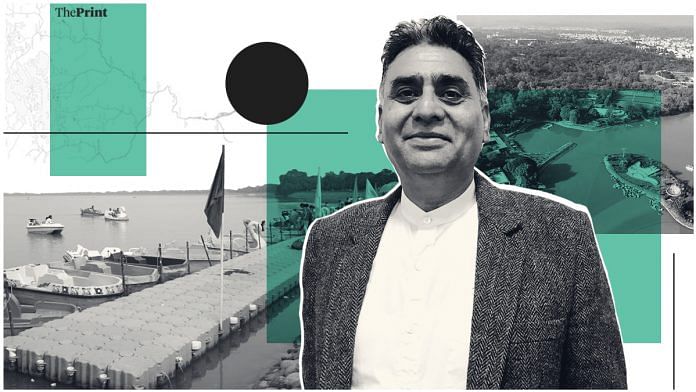Chandigarh: When the Punjab & Haryana High Court declared the Sukhna lake in Chandigarh a living entity this week, delivering the verdict was a usual suspect. Justice Rajiv Sharma, 61, has built quite a reputation for himself as a bold judge whose work is driven by a burning passion for the environment.
In different judgments, he has identified not just the animal kingdom but also the rivers Ganga and Yamuna — suffocating under an onslaught of human-caused pollution — as legal entities with rights.
At a time when humanity is becoming more aware about the sanctity of the environment in light of the climate change crisis, Sharma’s orders have frequently brought him into headlines.
However, while environment and its conservation remain Justice Sharma’s area of expertise, he has plenty of other notable orders under his belt.
Also Read: Environment is the most under-reported disaster of Narendra Modi government
The Sukhna verdict
The Sukhna verdict came from a division bench led by Sharma as it ordered the demolition of thousands of houses and commercial units constructed over the years in the lake’s catchment area, a sensitive ecological zone.
The bench also fined the Punjab and Haryana governments Rs 100 crore each for having “allowed” these constructions to come up despite a ban imposed by the court in 2011.
Sukhna is a man-made lake in the north of Chandigarh city. However, its catchment area falls in Punjab as well as Haryana, of which Chandigarh serves as joint capital.
In its 148-page judgment, the bench also directed the chief secretaries of the two states and the Chandigarh city adviser to set up a high-powered committee to fix accountability for the unauthorised constructions.
Orders through the years
Born on 8 October 1958, Sharma is an alumnus of Himachal Pradesh University.
He became a lawyer in 1982 and began his judicial career as an additional judge in the Himachal Pradesh High Court in 2007. He was confirmed as a permanent judge in 2013. He was transferred to the Uttarakhand High Court in 2016, where he also served as acting chief justice for a brief stint in 2018.
It was during his tenure as the Uttarakhand Chief Justice where he conferred the status of living beings on the rivers Ganga and Yamuna (later stayed by the Supreme Court on the state government’s challenge) and the animal kingdom.
In November 2018, he joined the Punjab & Haryana High Court, where he reiterated his judgment that the animal kingdom constitutes a living entity last year.
The order was issued in June, while the court was hearing a case about dozens of cattle heads being loaded onto vehicles and transported cruelly from Haryana to Uttar Pradesh.
The bench also laid down several mandatory directions for the welfare of the animal kingdom — it fixed the amount of load animals can carry and banned their use as load-bearers in harsh weather conditions.
In March last year, a bench headed by him barred the mention of caste in FIRs, describing it as a “colonial legacy”. The bench further ordered that police personnel will not mention the caste of the accused, the victims or the witnesses in any of the legal proceedings.
In July last year, a bench comprising Justice Sharma asked the central government and Punjab to make minimum support price (MSP) for farmers a matter of legal right. The MSP, the bench said, should be at least three times the cost of production.
The bench also asked Punjab to consider devising a scheme to compensate the families of debt-ridden farmers who commit suicide.
The same month, another bench featuring Justice Sharma gave a slew of directions to counter noise pollution. The court banned religious buildings from using loudspeakers and public address systems without written permissions, and prohibited the use of loudspeakers 15 days before and during annual school examinations.
The bench also asked Punjab, Haryana and Chandigarh to ensure that songs glorifying alcohol, drugs, weapons, violence and obscenity are not played at weddings or live shows. It described posters with nudity as an insult to women.
Later that month, Justice Sharma was on another bench that directed the Chandigarh administration to remove all encroachments from walkways in front of shops.
In September 2019, a bench he was on issued a host of measures meant to improve the working conditions of police personnel. The bench directed that policemen should only work in shifts and receive additional pay for working overtime.
“A constable, devoid of dignity, lacking opportunities for vertical mobility, constantly pressured by superiors and politicians, often not liked by the public and habituated to easy recourse to violence and force, cannot generally be expected to sustain his or her self-esteem or acquire the professional skills to serve the citizens,” the bench noted in its 250-page verdict.
Another strong order followed the next month, when a bench of the Punjab & Haryana High Court banned manual cleaning of sewers, septic tanks and manholes in its jurisdiction, terming the activity hazardous to human life. The cleaning, the bench said, should be done through machines.
The same month, a division bench led by Sharma directed the governments of India, Punjab and Haryana, besides the Chandigarh administration, to take a decision on linking Aadhaar cards with property sales to curtail benami transactions.
Later in October, Justice Sharma was on benches that barred Chandigarh autorickshaws from plying without meters, and shut down tanneries in Jalandhar’s Leather Complex to curtail pollution in a local water body.
In January this year, a bench he headed declared health a fundamental right while asking the Punjab government to address vacancies in a state hospital.
The same month, Sharma was on a bench that banned the display of stickers and symbols on all vehicles that identify one’s designation, profession, organisation etc. Sharma led by example and got a “high court” sticker removed from his own vehicle.
Also Read: India’s green cover up by over 5,000 sq km but existing forests lost trees: 2018 survey




Excellent